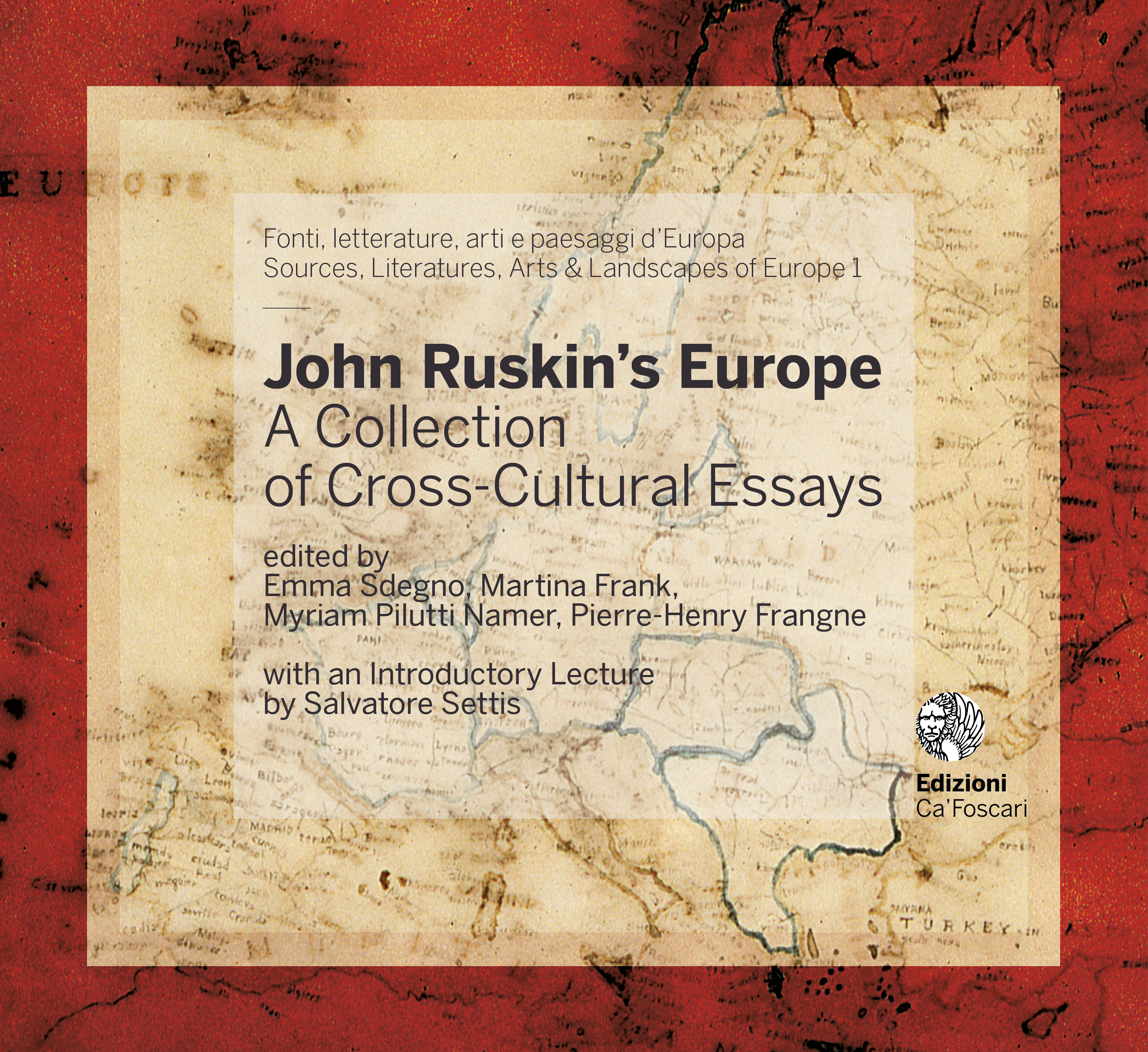
- search 3235 views
- file_download 1109 download
- keyboard_capslockmetadata
-
mark_email_readIscriviti alla newsletter
John Ruskin’s Europe. A Collection of Cross-Cultural Essays
With an Introductory Lecture by Salvatore Settis
a cura di
abstract
L’opera di Ruskin s’inscrive con forza nel grande contesto europeo, segnando un momento importante del movimento di costituzione di una cultura e di uno spirito comunitari. I saggi qui raccolti intendono porre al centro della riflessione critica il tema del rapporto fecondo e imprescindibile di Ruskin con l’Europa, presentandosi come occasioni di approfondimento e di confronto su questioni attinenti all’estetica, alla tutela del patrimonio materiale e immateriale, alla memoria culturale e letteraria. Portando all’attenzione della comunità scientifica i molteplici aspetti – geografici, storico-artistici, critico-estetici, letterari, socio-politici – dell’opera di Ruskin secondo prospettive inter- e transculturali, il volume si propone di (ri)scoprire un Ruskin deliberatamente europeo e di stimolare nuove rotte di ricerca.
-
Keywords keyboard_arrow_down
Composition • Il Marzocco • Venice • “Grand contexte” • Johan Joachim Winckelmann • Cardinal Manning • Old Road • François-René de Chateaubriand • Kenji Miyazawa • Anti-industrialism • Frédéric Ozanam • Gothic cathedrals • Social change • Ornament • Orient • Europe • Czech • Ruins • Hungary • Marcel Proust • Medieval Monuments in Italy • Carl Justi • Modern Japan • Byzantine Sculptures • Restoration • Drawing • Queen of the Air • Ruskin’s reception • Leo Tolstoy • National heritage • Lady Gregory • Cultural Heritage Conservation • Gothic • Poland • Working Men’s College • Social reform • Anglo-Italian Cultural Relationship • Phenomenology • Socialism • Lady Layard • Gustav von Waagen • Klosterhof Glienicke • Anglo-Austrian Cultural Relationship • Radicalism • Giacomo Leopardi • Nationalism • Nōmin-Geijutsu (Peasant Art) • La Bible d’Amiens • Medieval Art • Magazine “The Studio” • Art Market • Unto this Last • Dwelling in • Interpretation • French Gothic architecture • Transcultural history • Aesthetics of the 19th and 20th century • Intentionality • Legacy • Reception of Ancient Greek Art • Liberal Italy • Guild of St George • Novelty • Arts and Crafts Schools • Italian Folk poetry • Reception of Classical Antiquity • Sketching • The Story of Ida • The Bible of Amiens • Viollet-le-Duc • Lev Tolstoj’s reception in Italy • Disorientation • Humanity • Aesthetics • Shelter • Marx • Anti-machinism • Democratic Liberal • Photography • Memory • Observation • Spuybroek • Archival documents • Charlotte Broicher • Adult Education • Amelia Sarah Levetus • Anti-capitalism • Samuel Taylor Coleridge • Perception • Calais’ experience • Fioretti di San Francesco • Cultural heritage • Ruskin • Russia • Religious monuments • Comparatism • Optical thinker • Dante Alighieri • Francesca Alexander • Roadside Songs of Tuscany • Architecture • Robert de la Sizeranne • Travel writing • Yule family • Francesco Pajaro • Translation • Europe awareness • Museums of Venice • William Wordsworth • Degrowth • John Ruskin • Potsdam Friedenskirche • Version • Imaginary geography • Taishō Era • Aratra Pentelici • Rasu Chijin Kyōkai (Rasu Farmers Association) • Christian socialism • Liberalism • Tourism • Palermo • Turner • Arts and Crafts Movement • European aesthetics • Bridges • Travel • Political economy • State Museum Berlin • Islam • Design • Roads • Marxism • Abandonment • Sicily
Sommario
- search 336 view
- file_download 48 download
- search 205 view
- file_download 15 download
Ruskin: A European Aesthetic?
- search 246 view
- file_download 24 download
- search 415 view
- file_download 33 download
- search 444 view
- file_download 26 download
- search 376 view
- file_download 36 download
- search 366 view
- file_download 23 download
- search 428 view
- file_download 32 download
The Centres of Ruskin’s Europe
- search 290 view
- file_download 17 download
- search 277 view
- file_download 25 download
- search 333 view
- file_download 23 download
- search 456 view
- file_download 53 download
- search 391 view
- file_download 35 download
- search 325 view
- file_download 15 download
Literary Intersections
- search 387 view
- file_download 26 download
- search 716 view
- file_download 83 download
- search 359 view
- file_download 25 download
- search 431 view
- file_download 38 download
- search 305 view
- file_download 17 download
- search 315 view
- file_download 21 download
Culture and Society in Europe According to Ruskin
- search 388 view
- file_download 22 download
- search 420 view
- file_download 27 download
- search 291 view
- file_download 27 download
Appendix
- search 253 view
- file_download 17 download
